How farming and enterprise are fighting slavery in the Asia-Pacific region
10790 0
International development and poverty are complex. As aid and development agencies like Tearfund help empower communities to overcome problems facing them, many other factors contribute to the problems communities are trying to solve. That is why a single-focused approach cannot achieve as much, and a more integrated approach is necessary.
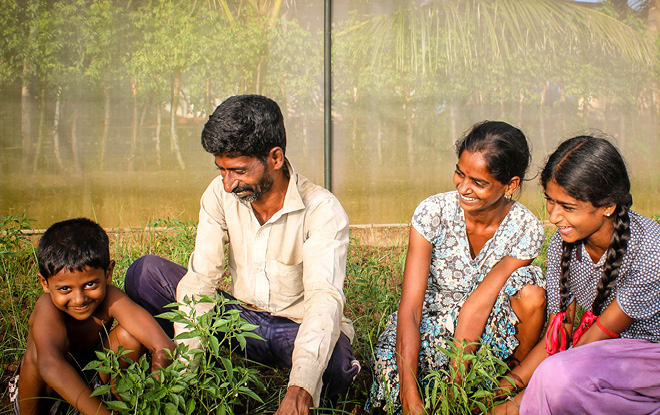
Tearfund has recently embarked on a five-year, multi-million-dollar partnership with the Ministry of Foreign Affairs and Trade (MFAT)
Tearfund is taking an integrated approach in a new programme aimed at protecting communities from exploitation, abuse and violence, which are, unfortunately, ever-present in the communities Tearfund partners with. Tearfund has recently embarked on a five-year, multi-million-dollar partnership with the Ministry of Foreign Affairs and Trade (MFAT) to address human trafficking, abuse and exploitation, while at the same time, improving rural livelihoods. The Safe, Aware, Free and Empowered (SAFE) programme covers five countries in the Asia-Pacific region, weaving together our Farming and Enterprise and Modern Slavery activities. The SAFE programme aims to benefit more than 20,000 people and indirectly impact more than 80,000.
The countries include
- Vanuatu
- Solomon Islands
- Fiji
- Sri Lanka
- Myanmar
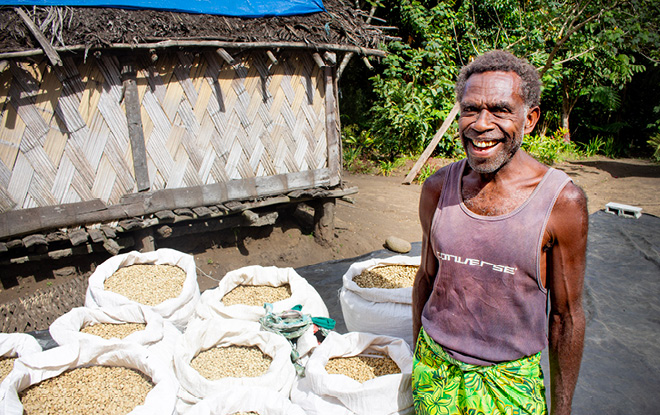
Tearfund's partner Nasi Tuan helps local farmers increase their incomes through growing coffee.
How farming and enterprise help protect people from exploitation
Within the SAFE programme, our agricultural livelihood interventions are predominantly in rural areas. Lack of opportunities in rural areas, in part, fuels urban drift, cutting people off from family and social structures—leaving people more vulnerable to exploitation and abuse.
Poverty is a big driver of modern slavery and exploitation, so raising incomes through farming and enterprise has proven to reduce vulnerability to being trafficked, exploited or abused. Poverty and inequality are also interlinked, and gender inequality, specifically, is one of the key drivers of poverty worldwide. This programme will facilitate greater sharing of expertise between partners implementing farming and enterprise-focused activities with those implementing modern slavery programmes.
Farming and enterprise are effective tools to help people lift themselves out of poverty and thrive. Tearfund champions community development to unlock opportunities for people who are vulnerable to disaster, disconnected from resources, and their broader communities and living below the poverty line.
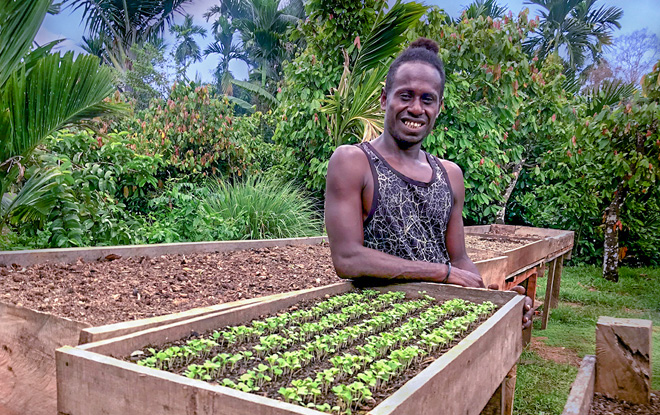
Farmers gain a stronger collective voice to advocate for better access to markets and work towards creating sustainable livelihoods together.
Our farming initiatives connect smallholder farmers to farmer cooperatives and social enterprises. Farmers gain a stronger collective voice to advocate for better access to markets and work towards creating sustainable livelihoods together. Increased and secure incomes enable farming households to send their children to school, provide proper nutrition to their families, actively contribute to their community, and have confidence and hope for their future.
While this is not part of our work in the Pacific currently, our enterprise work in other countries uses savings and loan groups called Self Help Groups. Each member saves a little each month to form a pool of funds from which they can borrow to support a small business and cover household expenses. These groups provide safe and supportive spaces to share experiences, knowledge, and resources to enable economic empowerment. They are propelling women into micro-enterprise and positions of leadership within their communities and bringing about positive social change.
Modern slavery is a widespread problem
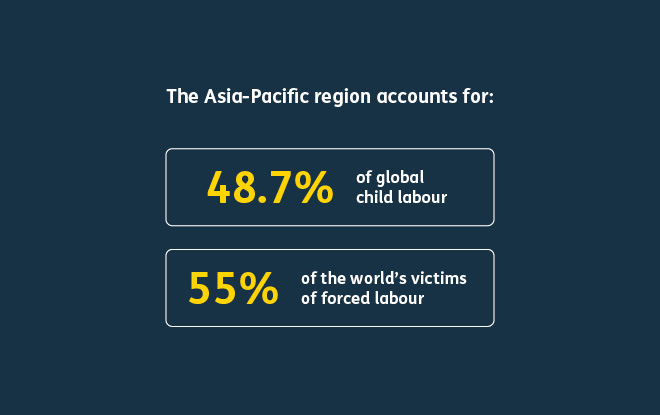
Sadly, the Asia-Pacific region is overrepresented in modern slavery stats.
According to the International Labour Organisation (ILO), about 50 million people worldwide are trapped in some form of modern slavery—this includes more than 15 million forced into marriage.
Approximately 55% of people trapped in forced labour are in the Asia-Pacific region and the number of children in forced labour is horrifically high at 48.7%. There are more working children than in any other region of the world. An estimated 122 million children aged 5-14 years are compelled to work for their survival.
To counter Modern Slavery, Tearfund employs a holistic and multi-pronged “Five Ps” approach, which draws on the International Framework for Action to Implement the Trafficking in Persons Protocol (UNODC, 2009).
The 5 Ps are:
Prevention: addressing the root causes of trafficking and exploitation to reduce vulnerabilities
Prosecution: increasing deterrence to trafficking and exploitation through investigating both domestic and cross-border cases, and prosecuting perpetrators through strengthening judicial systems
Protection: providing trauma-informed aftercare services for survivors
Partnership: supporting inter-agency collaboration and capacity strengthening
Policy: supporting research, policy development and advocacy to strengthen institutions and policy mechanisms to deliver justice and protect victims
The issue of Modern Slavery is complex and multifaceted, requiring an integrated response, collaboration and partnerships to strengthen referral pathways, create safety nets and act in the best interest of survivors. While we believe that raising people's incomes will help reduce their vulnerability to modern slavery, to fully protect people from harm, improvements are needed to help identify, support and protect survivors of trafficking, exploitation and abuse.
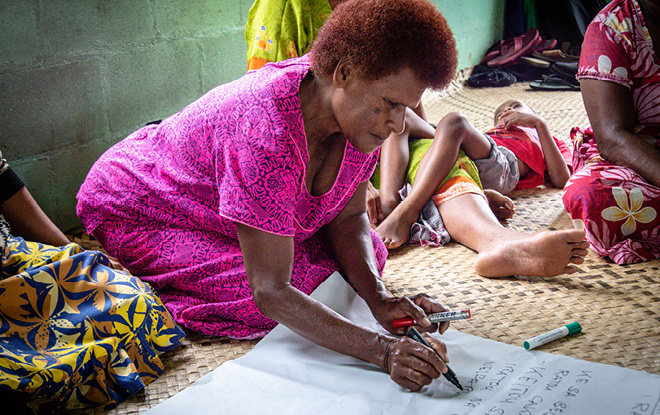
Tearfund's partner Homes of Hope educates men and women about forced sex and teaches them what to do if there is a case in their village.
We have specialised partners that work to help prevent exploitation of this kind and help survivors and they work together with our partners with expertise in farming and enterprise. The modern slavery partners in the SAFE programme will build community awareness and capacity to prevent and respond to human trafficking, commercial sexual exploitation and sexual abuse. Survivors will receive legal justice through access to improved local investigation procedures, and awareness about human trafficking and commercial sexual exploitation. Partners and social service providers will have increased knowledge of trauma-informed care to provide best-practice care to survivors, while our farming and enterprise partners will use farming and enterprise skills to reduce the vulnerability of exploitation using techniques to increase their incomes and feed families.
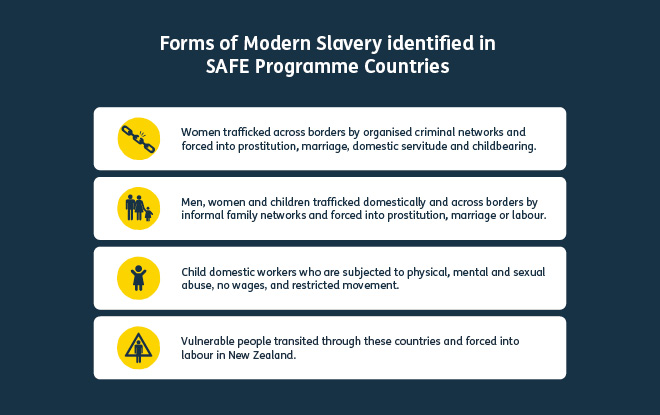
Intended Outcomes of SAFE
- Smallholder indigenous farmers are participating in mainstream markets and are producing commercially viable quantities of higher-value produce.
- Vulnerable households have increased incomes from their agricultural livelihoods, rise above the basic needs poverty line, and are less vulnerable to being exploited.
- Government agencies, NGOs, churches and communities are working together to protect children and young people from being trafficked, sexually exploited and abused.
- Children and young people know about trafficking, commercial sexual exploitation and sexual abuse, are confident to seek help, and use referral pathways to get that help.
- Survivors of trafficking and exploitation are successfully reintegrated into communities.
- Young people are contributing positively to their communities.
Want to hear more about these amazing projects? Why not come to our upcoming event, SAFE Futures: An evening with Sean Hatwell.
Event details:
Over drinks and nibbles, Modern Slavery expert Sean Hatwell will introduce us to Tearfund's Safe, Aware, Free and Empowered (SAFE) programme through stories from the field. The SAFE programme aims to reduce human trafficking and exploitation in five countries through Farming & Enterprise and Modern Slavery initiatives.
Locations & Venues:
17th August | Christchurch, Aldersgate Centre
24th August | Wellington, Mojo Coffee (Asteron Centre)
Cost: $35
Get Tickets